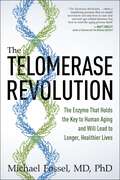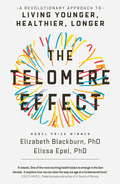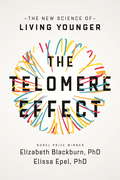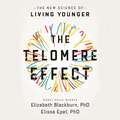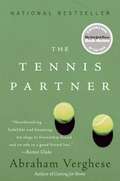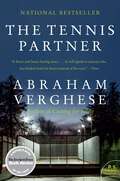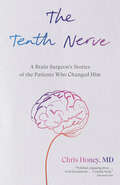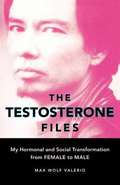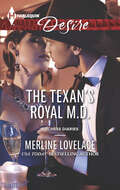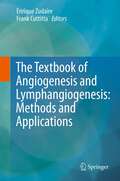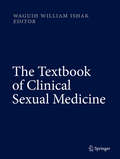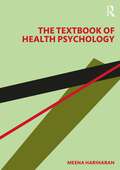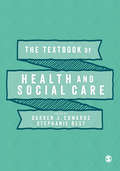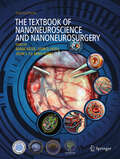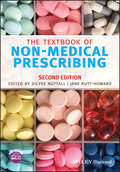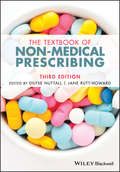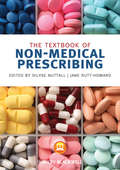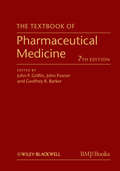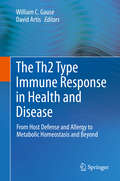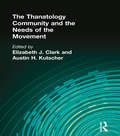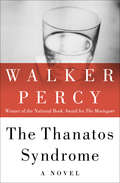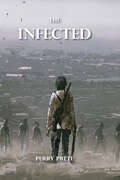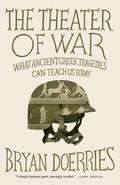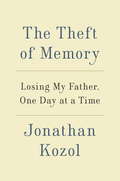- Table View
- List View
The Telomerase Revolution: The Enzyme That Holds the Key to Human Aging . . . and Will Soon Lead to Longer, Healthier Lives
by Michael FosselOne of Wall Street Journal's "Best Books for Science Lovers" in 2015 Science is on the cusp of a revolutionary breakthrough. We now understand more about aging—and how to prevent and reverse it—than ever before. In recent years, our understanding of the nature of aging has grown exponentially, and dramatic life extension—even age reversal—has moved from science fiction to real possibility. Dr. Michael Fossel has been in the forefront of aging research for decades and is the author of the definitive textbook on human aging. In The Telomerase Revolution, he takes us on a detailed but highly accessible scientific journey, providing startling insights into the nature of human aging. Twenty years ago, there was still considerable debate of the nature of human aging, with a variety of competing theories in play. But scientific consensus is forming around the telomere theory of aging. The essence of this theory is that human aging is the result of cellular aging. Every time a cell reproduces, its telomeres (the tips of the chromosomes) shorten. With every shortening of the telomeres, the cell's ability to repair its molecules decreases. It ages. Human aging is the result of the aging of the body's trillions of cells. But some of our cells don't age. Sex cells and stem cells can reproduce indefinitely, without aging, because they create telomerase. Telomerase re-lengthens the telomeres, keeping these cells young. The Telomerase Revolution describes how telomerase will soon be used as a powerful therapeutic tool, with the potential to dramatically extend life spans and even reverse human aging. Telomerase-based treatments are already available, and have shown early promise, but much more potent treatments will become available over the next decade. The Telomerase Revolution is the definitive work on the latest science on human aging, covering both the theory and the clinical implications. It takes the reader to the forefront of the upcoming revolution in human medicine.
The Telomere Effect: A Revolutionary Approach to Living Younger, Healthier, Longer
by Dr Elissa Epel Dr Elizabeth BlackburnHave you ever wondered why some sixty-year-olds look and feel like forty-year-olds, and why some forty-year-olds look and feel like sixty-year-olds? More importantly - can you choose which outcome will happen to you? Written by Nobel Prize winner Elizabeth Blackburn and health psychologist Elissa Epel, The Telomere Effect reveals the ground-breaking science at the heart of ageing - and what you can do to help reverse it.While many factors contribute to ageing and illness, Elizabeth and Elissa's award-winning research has revealed that the length of our telomeres - the part of our chromosomes which determine how fast our cells age and die - can have a direct effect on how quickly or slowly we age. In this pioneering book, discover for the first time the many simple changes you can make to your diet, sleep and mental wellbeing to look after your telomeres. From which foods to eat, types of exercise to practise, various mind tricks to prevent stress - and how to shield your children from developing shorter telomeres from conception through to adolescence - start protecting your telomeres and your youth today.
The Telomere Effect: A Revolutionary Approach to Living Younger, Healthier, Longer
by Dr Elissa Epel Dr Elizabeth BlackburnOne of the Best 'Brainy' Books of This Decade - The GuardianA ground breaking book on the history of Telomeres offering fresh advice on how to slow down aging and lengthen life. Nobel prize winning Doctor Elizabeth Blackburn and leading health psychologist Dr Elissa Epel have discovered biological markers called Telomeres which can help to understand how healthy our cells are and what we can do to improve them. The book specifically looks ideas including; how biological age is not chronological age; a biological basis for the mind-body connection, how sleep and diet can affect telomeres and shockingly how mothers who are highly stressed during pregnancy have children with shorter telomeres. It also offers tools and advice on how to determine cellular age and telomere health. Doctor Elizabeth Blackburn was awarded the Nobel Prize in Physiology or Medicine in 2009 for her discovery of telomeres and their role in the ageing process and has previously been named in TIME magazine's 100 Most Influential People.Dr. Elissa Epel is a leading health psychologist who has conducted pioneering research uncovering the psychobiological mechanisms related to how stress ages us and compromises our health-from emotional eating to unhealthy storage of abdominal fat to telomere shortening.
The Telomere Effect: A Revolutionary Approach to Living Younger, Healthier, Longer
by Dr Elissa Epel Dr Elizabeth BlackburnNobel prize winning Dr Elizabeth Blackburn and leading health psychologist Dr Elissa Epel have discovered biological markers called telomeres, which can help to understand how healthy our cells are and what we can do to improve them. THE TELOMERE SOLUTION looks at ideas including: how biological age is not chronological age, a biological basis for the mind-body connection and how sleep and diet can affect telomeres. It also offers tools and advice on how to determine cellular age and telomere health.Read by Suzanne Toren(p) 2017 Hachette Audio
The Tennis Partner: A Doctor's Story of Friendship and Loss
by Abraham VergheseWhen Abraham Verghese, a physician whose marriage is unraveling, relocates to El Paso, Texas, he hopes to make a fresh start as a staff member at the county hospital. There he meets David Smith, a medical student recovering from drug addition, and the two men begin a tennis ritual that allows them to shed their inhibitions and find security in the sport they love and with each other. This friendship between doctor and intern grows increasingly rich and complex, more intimate than two men usually allow. And just when it seems nothing more can go wrong, the dark beast from David's past emerges once again. As David spirals out of control, almost everything Verghese has come to trust and believe in is threatened. Compassionate and moving, The Tennis Partner is a unforgettable, illuminating story of how men live, and how they survive.
The Tennis Partner: A Doctor's Story of Friendship and Loss
by Abraham VergheseAn unforgettable, illuminating story of how men live and how they survive, from Abraham Verghese, the acclaimed New York Times bestselling author of Cutting for Stone and The Covenant of Water, an Oprah's Book Club Pick.“Heartbreaking. . . . Indelible and haunting, [The Tennis Partner] is an elegy to friendship found, and an ode to a good friend lost.”—The Boston GlobeWhen Abraham Verghese, a physician whose marriage is unraveling, relocates to El Paso, Texas, he hopes to make a fresh start as a staff member at the county hospital. There he meets David Smith, a medical student recovering from drug addiction, and the two men begin a tennis ritual that allows them to shed their inhibitions and find security in the sport they love and with each other. This friendship between doctor and intern grows increasingly rich and complex, more intimate than two men usually allow. Just when it seems nothing can go wrong, the dark beast from David’s past emerges once again—and almost everything Verghese has come to trust and believe in is threatened as David spirals out of control.
The Tenth Nerve: A Brain Surgeon's Stories of the Patients Who Changed Him
by Dr. Chris HoneyRiveting and dramatic, The Tenth Nerve offers a rare window into the world of a pre-eminent neurosurgeon and the seven exceptional patients that made him a better person.&“The scalpel can only go so deep, and technical skill can only take one so far.&” In this absorbing narrative, Dr. Chris Honey, an accomplished neurosurgeon at Vancouver General Hospital, weaves his personal journey together with case studies that reflect the thrill of scientific discovery and the limitations of medicine. Operating on a terminally ill child amid an Ebola outbreak in Liberia, he questions his preconceptions about what it means to "win" against a disease. Reflecting on his own path into neurosurgery, he brings to life a relatively new, high stakes field of medicine—one that historically demanded emotional detachment and often attracts extreme personalities. With a compassionate eye, he traces the courage and determination of several patients suffering from mysterious, unrecognized illnesses, two of whom led Dr. Honey and his team to discover an entirely new disease and its cure. In clear, engaging prose, he invites us into the operating room to witness this extraordinary discovery—involving the tenth cranial nerve—alongside him. And, outside the OR, an unusual friendship with a former patient alters his perspective on clinical detachment, and what "quality of life" really means. Combining a humane perspective, lively anecdotes, and a deep curiosity about the uncharted territories of the human brain, The Tenth Nerve is a richly fascinating memoir that will fill you with wonder.
The Testosterone Files: My Hormonal and Social Transformation from Female to Male
by Max Wolf ValerioYoung Anita Valerio, radical lesbian feminist, poet and performance artist realizes she is transsexual and begins testosterone hormone treatment as the first stage of transitioning to the male gender and renaming herself Max Wolf Valerio. This autobiography follows Valerio from childhood into his mid 30's. He analyzes the differences between the genders that the roles of estrogen and testosterone play. As he transitions, he muses and compares various issues, such as authority, emotional intensity, territoriality, violence, social constructs, and intensity of sexual behaviors. This book is quite compelling both for the personal process and Valerio's ability to question normative male behaviors as he finds himself responding to both the testosterone and the male culture.
The Texan's Royal M.D. (Duchess Diaries #2357)
by Merline LovelaceAn aristocratic doc has a holiday fling that could last a lifetime in this charming romance from the bestselling author of Her Unforgettable Royal Lover. Texas is the perfect place for holiday heat—exactly what Dr. Anastazia St. Sebastian needs before making the biggest decision of her career. Enter hunky shipping billionaire Mike Brennan, who insists on buying her dinner after she saves his nephew. But one night leads to more. And even three days of fun in the sun—and in Mike’s bedroom—aren’t enough. This doc of royal descent wants to fall in love . . . but how can she when what Mike wants is the one thing she can never give?
The Textbook of Angiogenesis and Lymphangiogenesis: Methods and Applications
by Enrique Zudaire Frank CuttittaAngiogenesis and lymphangiogenesis have become attractive targets for drug therapy because of their key roles in a broad spectrum of pathological disease states ranging from macular degeneration to tumor growth and metastasis. A substantial increase in the research effort over the past decade has deepened our understanding of the basic mechanisms underlying angiogenesis and lymphangiogenesis, promoting the development of promising therapeutics for the clinical management of vascular-related diseases. These extraordinary advancements have been built upon a vast array of diverse analytical techniques developed globally throughout the field. Over the years, these methods have evolved to suit the specific needs of different researchers and experimental scenarios, resulting in a myriad of technical variants of basic assay approaches. "The Textbook of Angiogenesis and Lymphangiogenesis: Methods and Applications" is an up-to-date comprehensive textbook on angiogenesis and lymphangiogenesis techniques and applications. This volume is designed to embody the collective works of experts in the clinical as well as the basic research arenas who have significantly contributed to the development and application of techniques in all areas of angiogenesis and lymphangiogenesis. Each chapter introduces and discusses one or a group of closely related techniques and convey step-by-step protocol information and detailed technical guidance to the reader. Emphasis has been placed on explanatory illustrations, critical technical steps as well as divulging information on the benefits and caveats of specific practices related to the methods discussed. This manual is intended to serve as a written guide for both newcomers and established professionals in the field.
The Textbook of Clinical Sexual Medicine
by Waguih William Ishak“The Textbook of Clinical Sexual Medicine utilizes the biopsychosocial approach to inform physicians, practitioners, residents, trainees, and students about the latest science has to offer today for the evaluation and treatment of sexual dysfunctions especially the utilization of the full armamentarium of assessment methods and treatment interventions in order to restore of sexual health and enhance quality of life.” Louis Ignarro, Ph.D., Nobel LaureateThis textbook is a comprehensive resource covering sexual disorders in depth, from etiology, pathophysiology, phenomenology, treatment, to prognosis. The book highlights aspects the biological and psychosocial factors predisposing, precipitating, and perpetuating sexual dysfunction, and the importance of integrating biological and psychosocial treatments. Specialized chapters cover specific common medical complaints, including erectile, ejaculatory, and orgasmic disorders in the male; desire, arousal and orgasmic disorders in the female; and an integrated approach to the couple. With its focus on educational tools including over 100 figures, easy-to-use DSM-5 criteria table, and quick-guide appendices, this textbook is specially designed to educate readers on the psychiatric evaluation, treatment, and management of a wide range of sexual disorders. The Textbook of Clinical Sexual Medicine is a vital resource for medical students, residents, fellows, graduate students, psychiatrists, psychologists, women’s health specialists, urologists, endocrinologists, general practitioners, social workers, and all medical professionals and trainees working with patients suffering from sexual disorders.
The Textbook of Health Psychology
by Meena HariharanThis book examines the concept of health psychology following its trajectory from ancient to contemporary times. It analyses the theories, practice and research in health psychology from both Indian and Western perspectives. The volume brings together knowledge diversified across various narrow subfields. It expounds upon physiological psychology; chronic illnesses associated with physiological systems; and biopsychosocial approaches to treatment and management with therapeutic interventions integrated throughout the book. It further discusses health promotive and health risk behaviour with reference to health policies and databases at national and global levels. This book will be beneficial to the students, researchers and teachers of psychology, applied psychology, public health, public policy, community health, and medical and paramedical studies. It will also be indispensable to the policy-makers and NGOs working in the field of public health.
The Textbook of Health and Social Care
by Darren Edwards Stephanie BestA comprehensive textbook designed to get you through the entirety of your Health and Social Care BSc degree. Covering all the important topics and pressing issues relevant to Health and Social Care today. The book is split into three parts, starting with the essential areas and core knowledge you will need as you start your degree, these include the sociology and psychology of illness, academic skills, key legal and ethical issues, reflective practice, and the research process. Before moving onto health and social care in practice, highlighting topics such as health promotion, safeguarding children and their rights, and working with people experiencing mental health disorders. The final part covers some of the challenges faced in present day health and social care, looking at social justice issues, legal and ethical considerations, leadership, and health inequalities. All content is supported by practical and reflective features to help you throughout your degree, these include: Interactive activities, real life case studies and examples related to chapter content, links and suggestions for further reading, and answers to key activities and case studies exercises. The perfect companion text for a Health and Social Care degree, or any other course related to the health and social care services.
The Textbook of Health and Social Care
by Darren Edwards Stephanie BestA comprehensive textbook designed to get you through the entirety of your Health and Social Care BSc degree. Covering all the important topics and pressing issues relevant to Health and Social Care today. The book is split into three parts, starting with the essential areas and core knowledge you will need as you start your degree, these include the sociology and psychology of illness, academic skills, key legal and ethical issues, reflective practice, and the research process. Before moving onto health and social care in practice, highlighting topics such as health promotion, safeguarding children and their rights, and working with people experiencing mental health disorders. The final part covers some of the challenges faced in present day health and social care, looking at social justice issues, legal and ethical considerations, leadership, and health inequalities. All content is supported by practical and reflective features to help you throughout your degree, these include: Interactive activities, real life case studies and examples related to chapter content, links and suggestions for further reading, and answers to key activities and case studies exercises. The perfect companion text for a Health and Social Care degree, or any other course related to the health and social care services.
The Textbook of Nanoneuroscience and Nanoneurosurgery
by John S. Yu Babak Kateb John D. Heiss Ming HsiehThis textbook highlights the exciting field of nanoneuroscience and its potential to transform how we diagnose and treat neurological disorders. "The Textbook of Nanoneuroscience and Nanoneurosurgery," dives deep into this emerging field, exploring the latest tools and techniques currently being developed at the nanoscale level. Key areas of focus include: Nanoplatforms: The book explores how scientists utilize materials on a near-microscopic scale for neurosurgery, neurology, and brain imaging applications. Bridging the Gap: Regulatory hurdles for translating research from the lab to real-world use are addressed, paving the way for future advancements. The Future is Now: The book showcases recent breakthroughs already impacting patient care alongside promising areas with significant potential. Collaboration is Key: Insights from over 220 researchers and 5000+ references, along with illustrative figures in B/W and color, provide a comprehensive overview of this dynamic field. With its focus on minimally invasive procedures and the latest regulatory considerations, "The Textbook of Nanoneuroscience and Nanoneurosurgery" equips researchers and medical professionals with the knowledge to develop groundbreaking treatments for neurological conditions. The text also reviews the latest regulatory guidelines that influence the translation of nanotechnological research from the laboratory to the clinic and the most recent information on biodevices and pharmaceutical spinoffs. It highlights presidential and congressional initiatives and programs that may impact the field soon. Some reviews of the First edition of the textbook. "…a significant contribution to the field of nanoneuroscience and nanoneurosurgery … the reader will come away with a deeper understanding of the history of nanotechnology and medicine." —Neuroscience "This is a monumental first textbook on nanoneurosurgery. … recommended reading for neurosurgeons, neurologists, neuroradiologists, and neuroscientists involved in research on new techniques for application in neurosurgery. Biomedical engineers and various companies developing instruments and devices would benefit from the wealth of information about trends for the development of new technologies for neurosurgery." K. K. Jain, MD, Basel, Switzerland "Phenomenal body of knowledge in this book that would take eons to collate by myself. Every answer to every one of my questions plus heaps more. Essential reading for everyone interested in the field. A must-have!" Albert Deme "This is an amazing foray into the future of a largely unexplored, but increasingly critical medical domain…..I have learned much from every page of this captivating text, and I highly recommend it to any medical student, researcher, medical professional in the neurosciences, or anyone who has an interest in the human brain and the future of medicine, to gather a glimpse of the incredible and beneficial paradigm shifts that will soon impact the field of neuroscience." Frank Boehm, British Columbia, Canada
The Textbook of Non-Medical Prescribing
by Jane Rutt-Howard Dilyse NuttallThe Textbook of Non-Medical Prescribing addresses all the key issues relevant to non-medical prescribing, bringing together essential knowledge, key issues, and skills in a single text.This accessible, engaging and comprehensive resource explores the history of non-medical prescribing; prescribing in context; ethical, legal and professional issues in relation to prescribing practice; factors influencing prescribing; effective consultations; essential pharmacology; the role of the multi-disciplinary team; clinical skills; prescribing for specific groups; and the future of nurse prescribing. With case studies throughout, The Textbook of Non-Medical Prescribing is essential reading for all students on non-medical prescribing courses. It is also of use to qualified health professionals, be they prescribers themselves or interested in the concepts of non-medical prescribing.
The Textbook of Non-Medical Prescribing
by Jane Rutt-Howard Dilyse NuttallTHE TEXTBOOK OF NON-MEDICAL PRESCRIBING THIRD EDITION The Textbook of Non-Medical Prescribing is an authoritative and accessible overview of the vital skills, contemporary issues and essential knowledge relevant to both students and healthcare practitioners. Written as a response to the growing emphasis placed on prescribing in the modern health service, this text provides up-to-date information on safe and effective prescribing. This wide-ranging book helps students and trainees develop foundational knowledge of the key areas and prescribing competencies and provides healthcare professionals with a continued source of current information. Now in its third edition, this text has been fully updated and revised to reflect changes in legislation, current practices and new guidelines. New and updated topics include independent prescribing for therapeutic radiologists, supplementary prescribing for dietitians, paramedics working in advanced roles to independently prescribe and the Royal Pharmaceutical Society's Competency Framework for all Prescribers. Provides up-to-date information essential to safe and effective prescribing in a clear, easy-to-understand style Discusses current issues and practices in pharmacology, prescribing and therapeutics and medicine management Links to the Royal Pharmaceutical Society's Competency Framework for all Prescribers for non-medical prescribers Presents learning objectives, key theme summaries, activities and numerous case studies Offers access to additional online resources including interactive exercises, quizzes, self-assessment tests and web links The Textbook of Non-Medical Prescribing is an essential resource for students, nurses, dieticians, pharmacists, and allied health practitioners pursuing a prescribing qualification or looking for an updated refresher on the subject.
The Textbook of Non-Medical Prescribing
by Jane Rutt-Howard Dilyse NuttallThe Textbook of Non-Medical Prescribing addresses all the key issues relevant to non-medical prescribing, bringing together essential knowledge, key issues, and skills in a single text. This accessible, engaging and comprehensive resource explores the history of non-medical prescribing; prescribing in context; ethical, legal and professional issues in relation to prescribing practice; factors influencing prescribing; effective consultations; essential pharmacology; the role of the multi-disciplinary team; clinical skills; prescribing for specific groups; and the future of nurse prescribing. With case studies throughout, The Textbook of Non-Medical Prescribing is essential reading for all students on non-medical prescribing courses. It is also of use to qualified health professionals, be they prescribers themselves or interested in the concepts of non-medical prescribing.
The Textbook of Pharmaceutical Medicine
by Geoffrey R. Barker John P. Griffin John PosnerThe Textbook of Pharmaceutical Medicine is the standard reference for everyone working and learning in pharmaceutical medicine. It is a comprehensive resource covering the processes and practices by which medicines are developed, tested and approved, and the recognised text for the Diploma in Pharmaceutical Medicine from the Faculty of Pharmaceutical Medicine.This fully revised Seventh Edition, which includes two new Editors, encompasses current developments within pharmaceutical medicine with new chapters on biological therapeutics, pharmacovigilance, vaccines, drugs for cancer, drug development in paediatrics and neonatalogy, the clinical trials directive, life cycle management of medicines, counterfeit medicines and medical marketing. Also included for easy reference, and referred to throughout the text, are the Declaration of Helsinki, Guidelines and Documentation for Implementation of Clinical Trials, relevant European Directives and the Syllabus for Pharmaceutical Medicine.Written by an international team of leading academics, medical directors and lawyers, The Textbook of Pharmaceutical Medicine, Seventh Edition meets the needs of both those working in pharmaceutical medicine and preparing for the Diploma in Pharmaceutical Medicine.The text breaks down into three core sections:Part I: Research and DevelopmentPart II: RegulationPart III: Healthcare marketplaceView Table of Contents in detail
The Th2 Type Immune Response in Health and Disease
by David Artis William C. GauseThe type 2 immune response that develops during infectious disease has undergone major paradigm shifts in the last several years as new cell types and pathways have been identified. It is now clear that the type 2 immune response, characterized by elevations in specific cytokines, including IL-4, IL-5 and IL-13, is associated with helminth infections in both humans and mice. This response is complex and includes effector functions that mediate resistance, contributing to expulsion and in some cases destruction, of the parasite. But just as importantly, the type 2 immune response can also mediate tolerance mechanisms, which can mitigate tissue injury as these large multicellular parasites transit through vital organs. The tolerance mechanisms include both tissue repair and immune regulatory effects. These latter aspects of the helminth-induced type 2 immune response are increasingly recognized as a potential resource that can be mined for the development of novel immunotherapies that may enhance wound healing, control of autoimmune and inflammatory diseases and regulation of metabolic homeostasis. In this book, leading researchers in this exciting and dynamic field discuss the latest findings and emerging concepts, providing an intellectual framework that can be used as a basis for new discoveries and potentially new treatments for diseases associated with inflammation.
The Thanatology Community and the Needs of the Movement
by Austin H. Kutscher Elizabeth J. ClarkHere is an excellent new book packed with state-of-the-art information on thanatology. It presents valuable insights on the history, current issues, and future directions for the modern death movement. This comprehensive volume is unique in that it offers multiple perspectives on the issues and problems facing the thanatology movement in the United States from well-known experts in a variety of fields, including nursing, psychology, death education, medicine, ethics, and suicide prevention. By crossing disciplinary boundaries, these authoritative contributors are able to critically examine the entire thanatological community and provide glimpses of an agenda for the 1990s. The Thanatology Community and the Needs of the Movement provides valuable insights on important issues in the field such as: ethical concerns in thanatology setting standards for the field of thanatology advocacy and empowerment for the dying, the bereaved, and their caregivers effective approaches to death education for professionals and for the public sector suicide prevention Individual chapters address such pertinent topics as educational needs in thanatology, the undervaluation of caregiving, policy legislation for issues facing the terminally ill or bereaved, and the care of children facing death. This groundbreaking book gives death educators, academic nurses, clergy, divinity school faculty, and academic and clinical psychologists the keys to advancing scholarship and practice in the field of thanatology. Its interdisciplinary focus facilitates better cooperation between academics and practitioners to ultimately enhance all services for the dying and bereaved.
The Thanatos Syndrome: A Novel (Narrativa Mondadori Ser.)
by Walker PercyPercy&’s stirring sequel to Love in the Ruins follows Tom More&’s redemptive mission to cure the mysterious ailment afflicting the residents of his hometownDr. Tom More returns to his parish in Louisiana determined to live a simpler life. Fresh out of prison after getting caught selling uppers to truck drivers, he wants nothing more than to live &“a small life.&” But when everyone in town begins acting strangely—from losing their sexual inhibitions to speaking only in blunt, truncated sentences—More, with help from his cousin Lucy Lipscomb, takes it upon himself to reveal what and who is responsible. Their investigation leads them to the highest seats of power, where they discover that a government conspiracy is poised to rob its citizens of their selves, their free will, and ultimately their humanity.
The The Infected
by Perry PreteA virus infects the world, altering human DNA. The Infected live at night, humans during the day. Each group avoids the other, as humans search for an area free of The Infected until an unlikely bond occurs between the two.
The Theater of War: What Ancient Greek Tragedies Can Teach Us Today
by Bryan DoerriesThis is the personal and deeply passionate story of a life devoted to reclaiming the timeless power of an ancient artistic tradition to comfort the afflicted. For years, theater director Bryan Doerries has led an innovative public health project that produces ancient tragedies for current and returned soldiers, addicts, tornado and hurricane survivors, and a wide range of other at-risk people in society. Drawing on these extraordinary firsthand experiences, Doerries clearly and powerfully illustrates the redemptive and therapeutic potential of this classical, timeless art: how, for example, Ajax can help soldiers and their loved ones better understand and grapple with PTSD, or how Prometheus Bound provides new insights into the modern penal system. These plays are revivified not just in how Doerries applies them to communal problems of today, but in the way he translates them himself from the ancient Greek, deftly and expertly rendering enduring truths in contemporary and striking English. The originality and generosity of Doerries's work is startling, and The Theater of War--wholly unsentimental, but intensely felt and emotionally engaging--is a humane, knowledgeable, and accessible book that will both inspire and enlighten. Tracing a path that links the personal to the artistic to the social and back again, Doerries shows us how suffering and healing are part of a timeless process in which dialogue and empathy are inextricably linked.From the Hardcover edition.
The Theft of Memory: Losing My Father, One Day at a Time
by Jonathan KozolNational Book Award winner Jonathan Kozol is best known for his fifty years of work among our nation's poorest and most vulnerable children. Now, in the most personal book of his career, he tells the story of his father's life and work as a nationally noted specialist in disorders of the brain and his astonishing ability, at the onset of Alzheimer's disease, to explain the causes of his sickness and then to narrate, step-by-step, his slow descent into dementia. Dr. Harry Kozol was born in Boston in 1906. Classically trained at Harvard and Johns Hopkins, he was an unusually intuitive clinician with a special gift for diagnosing interwoven elements of neurological and psychiatric illnesses in highly complicated and creative people. "One of the most intense relationships of his career," his son recalls, "was with Eugene O'Neill, who moved to Boston in the last years of his life so my father could examine him and talk with him almost every day." At a later stage in his career, he evaluated criminal defendants including Patricia Hearst and the Boston Strangler, Albert H. DeSalvo, who described to him in detail what was going through his mind while he was killing thirteen women. But The Theft of Memory is not primarily about a doctor's public life. The heart of the book lies in the bond between a father and his son and the ways that bond intensified even as Harry's verbal skills and cogency progressively abandoned him. "Somehow," the author says, "all those hours that we spent trying to fathom something that he wanted to express, or summon up a vivid piece of seemingly lost memory that still brought a smile to his eyes, left me with a deeper sense of intimate connection with my father than I'd ever felt before." Lyrical and stirring, The Theft of Memory is at once a tender tribute to a father from his son and a richly colored portrait of a devoted doctor who lived more than a century.From the Hardcover edition.
